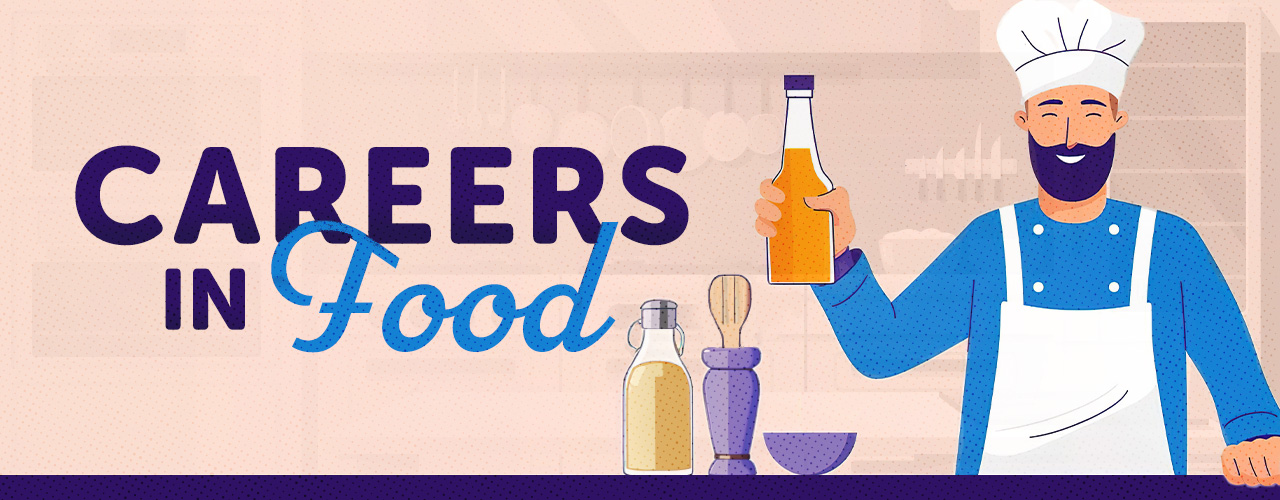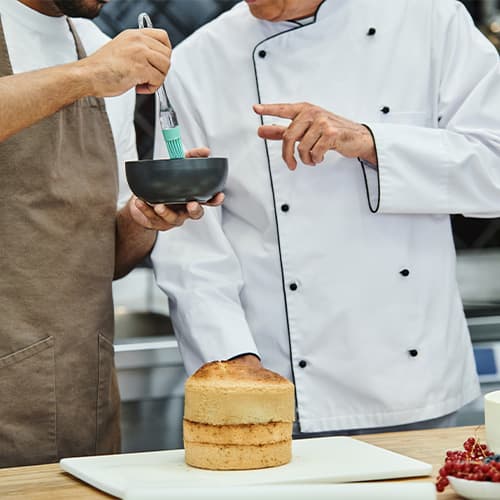
If you have a culinary degree and don't think becoming a chef is the right fit for you, there are many job opportunities where your education is a major benefit. From food blogging and recipe development to catering, food styling, and management, there are many ways to apply culinary skills in diverse settings. These careers allow professionals to work in media, education, hospitality, and food production while still engaging with their passion for culinary arts. Whether you enjoy writing, teaching, or creating new recipes, there are many fulfilling opportunities in the culinary industry.
Note: Average salaries listed below are current as of this article's publication and generalized across the US. For salary ranges specific to your region, check job recruitment forums and listings.
1. Food Stylist

A food stylist arranges and prepares food for photography, film, and live presentations to make it look visually appealing. They work on advertisements, cookbooks, television shows, and restaurant menus, using techniques to enhance a dish’s appearance under lighting and camera conditions. This role suits creative individuals with a strong eye for detail and a passion for food and aesthetics. Food stylists collaborate with chefs, photographers, and marketing teams to create stunning food imagery.
- Food Stylist Qualifications: Food stylists must have a strong culinary background, such as obtaining a culinary or food science degree, with a focus on food presentation. Hands-on experience in food preparation, plating techniques, and visual composition is essential. Many food stylists start as assistants to gain industry experience and build a portfolio.
- Food Stylist Career Path: Many begin as chefs, food photographers, or assistants to established food stylists to build a portfolio. With experience, they can work on high-profile projects for major brands, magazines, or television productions. Some successful stylists transition into roles such as creative food directors, culinary consultants, or cookbook authors.
- Food Stylist Average Salary: $60,000 to $65,000 annually
2. Food Writer
A food writer creates long-form content about the culinary world, covering restaurant reviews, food trends, chef interviews, and industry news. Some titles within this field include food critics, bloggers, and copywriters for newspapers, magazines, foodservice retailers, and online publications. Some work independently as bloggers or freelancers, while others hold staff positions at media outlets. Strong storytelling skills, a deep understanding of food, and the ability to analyze flavors and trends are essential for success.
- Food Writer Qualifications: A degree in journalism, communications, English, or culinary arts is beneficial to becoming a staff food writer. Experience in food writing, blogging, or the restaurant industry overall helps build credibility, but skills like strong research, creativity, and storytelling are fundamental to this role.
- Food Writer Career Path: Many food writers start as freelance writers, restaurant critics, or food bloggers before securing staff positions with publications. Experienced food writers may become editors, cookbook authors, or media personalities, while others transition into content creation for food brands or television.
- Food Writer Average Salary: $60,000 to $65,000 annually
3. Chocolatier

A chocolatier crafts chocolates, confections, and artistic chocolate designs for retail shops, bakeries, and gourmet brands. They temper chocolate, create fillings, and experiment with flavors to produce high-quality sweets. This role is perfect for individuals with a passion for creativity, precision, and working with their hands. Chocolatiers often work in specialty chocolate shops, pastry kitchens, or their own businesses.
- Chocolatier Qualifications: A formal culinary or pastry arts degree is helpful but not always required to become a chocolatier. Hands-on experience in chocolate work, pastry kitchens, or confectionery production is critical to getting hired in this field. Many chocolatiers train through apprenticeships, specialized courses, or professional certification programs.
- Chocolatier Career Path: Many chocolatiers start as pastry chefs, confectioners, or apprentices under experienced chocolatiers. With experience, they can advance to head chocolatier positions, open their own chocolate business, or develop signature chocolate brands. Some also teach or consult for major chocolate manufacturers.
- Chocolatier Average Salary: $40,000 to $45,000 annually
4. Food Safety Specialist
A food safety specialist ensures that foodservice establishments, manufacturers, and suppliers follow proper safety and sanitation regulations. They conduct inspections, develop safety protocols, and educate staff on best practices to prevent contamination and foodborne illnesses. This role is ideal for detail-oriented individuals who enjoy problem-solving and ensuring public health standards are met. Food safety specialists work in government agencies, corporate food production, restaurants, and regulatory consulting firms.
- Food Safety Specialist Qualifications: Food safety specialists are required to have a bachelor's degree or higher in food science, microbiology, public health, or a related field. Many employers prefer candidates with certifications like ServSafe, HACCP, or CFSP. Experience in foodservice, manufacturing, or regulatory compliance strengthens qualifications.
- Food Safety Specialist Career Path: Many food safety specialists start as quality control technicians, health inspectors, or foodservice managers before moving into food safety roles. With experience, they can become food safety managers, auditors, or regulatory consultants. Some advance to senior roles in government agencies or corporate food safety divisions.
- Food Safety Specialist Average Salary: $61,000 to $66,000 annually
5. Recipe Developer

A recipe developer creates and tests new recipes for restaurants, food brands, cookbooks, and media outlets. They research ingredients, experiment with flavors, and refine techniques to ensure recipes are both delicious and practical. Some work for food companies and test kitchens, while others freelance for magazines, blogs, or television programs. This role requires creativity, precision, and a deep understanding of cooking techniques and ingredient interactions.
- Recipe Developer Qualifications: Many recipe developers hold a culinary degree or a degree in food science, nutrition, or a related field. Experience as a chef, food stylist, or test kitchen assistant is often required, and many jobs will request a recipe portfolio. Strong writing skills are also helpful for those working in publishing or media.
- Recipe Developer Career Path: Recipe developers often begin as chefs, food writers, or test kitchen assistants to gain the necessary experience. Advancement opportunities include becoming a senior recipe developer, food scientist, or culinary director for a food brand. Some also publish cookbooks or work as consultants for restaurants and food manufacturers.
- Recipe Developer Average Salary: $78,000 to $83,000 annually
6. Private Chef
A private chef prepares customized meals for individuals, families, or small events, often working in private homes or on a freelance basis. They create personalized menus, shop for ingredients, and cook meals tailored to their clients' dietary needs and preferences. This role suits chefs who enjoy flexibility, creativity, and working closely with clients. Many private chefs also provide meal prep services or cater small gatherings.
- Private Chef Qualifications: While a culinary degree is beneficial, a private chef only needs a high school diploma and a food safety certification. However, strong cooking skills and professional kitchen experience are the most important qualifications. Many private chefs gain experience as restaurant chefs, caterers, or private cooks before starting their own business.
- Private Chef Career Path: Many private chefs start as line cooks, sous chefs, or senior chefs before transitioning into private chef work. With experience, private chefs can expand their client base, offer specialized services like dietary consulting, or open a catering business.
- Private Chef Average Salary: $88,000 to $93,000 annually
7. Foodservice Events Specialists

Catering and events specialists manage food preparation and service for special events, ensuring quality and efficiency. Roles in this field include catering managers, pitmasters, food truck owners, and wedding cake designers. These professionals work at weddings, corporate gatherings, festivals, and private events, often customizing menus to fit client needs. This career is ideal for those who enjoy fast-paced environments, mobile settings, creativity, and direct client interaction.
- Event Specialist Qualifications: A degree in culinary arts, hospitality management, or business can be beneficial but is not always required for event-based roles. Experience in food preparation, event planning, or catering operations is essential. Strong organizational and customer service skills help professionals excel in this field.
- Event Specialist Career Path: Many start as line cooks, pastry chefs, or catering assistants before moving into management or ownership roles. With experience, catering professionals can expand their businesses, work with high-profile clients, or open specialized event-focused foodservice operations.
- Event Specialist Average Salary: $55,000 to $60,000 annually
8. Nutritionist
A nutritionist advises individuals and groups on healthy eating habits, dietary plans, and nutritional wellness. They work in hospitals, schools, wellness centers, or private practice, helping clients manage health conditions, improve performance, or achieve specific dietary goals. This role is ideal for those passionate about food, health, and science, with a desire to educate others on making better nutritional choices. Some nutritionists specialize in sports nutrition, weight management, or holistic health.
- Nutritionist Qualifications: A degree in nutrition, dietetics, culinary arts, or a related field is typically required for nutritionists. Some states require certification or licensing, while registered dietitians (RDs) must complete an accredited internship and pass an exam. Experience in healthcare, food service, or wellness programs strengthens qualifications.
- Nutritionist Career Path: Many nutritionists start as dietetic interns, wellness coaches, or food service managers before becoming full-time nutritionists. With experience, they can advance to senior nutritionist roles, specialize in clinical nutrition, or open a private practice. Some pursue additional certifications in sports nutrition, pediatric nutrition, or holistic wellness.
- Nutritionist Average Salary: $68,000 to $73,000 annually
9. Chef Instructor

A chef instructor teaches culinary techniques, kitchen management, and food science in culinary schools, community colleges, and professional training programs. They guide students through hands-on cooking exercises, mentor aspiring chefs, and develop lesson plans covering practical skills and industry knowledge. This role is ideal for experienced chefs who enjoy teaching, mentoring, and sharing their passion for food. Chef instructors help shape the next generation of culinary professionals while staying engaged in the evolving food industry.
- Chef Instructor Qualifications: A culinary degree and several years of professional kitchen experience are typically required to become an instructor. Many institutions prefer instructors with teaching credentials, certifications (such as Certified Executive Chef or Certified Culinary Educator), and leadership experience in restaurants or food service. Strong communication and instructional skills are essential.
- Chef Instructor Career Path: Many culinary instructors start as restaurant chefs, executive chefs, or pastry chefs before transitioning into education. With experience, chef instructors can advance to department heads, academic directors, or curriculum developers. Some also write cookbooks, develop online culinary courses, or consult for food industry training programs.
- Chef Instructor Average Salary: $45,000 to $50,000 annually
10. Foodservice Management Roles
Management roles in the foodservice industry oversee operations, staff, and supply chains to ensure efficiency and profitability. Positions include restaurant managers, food and beverage managers, purchasing managers, dining services directors, logistics specialists, and supply chain managers. These roles require strong leadership, problem-solving, and organizational skills to maintain smooth day-to-day operations. Management is a great fit for individuals who thrive in fast-paced environments, enjoy leading teams, and have a passion for foodservice excellence.
- Foodservice Management Qualifications: A degree in hospitality management, business administration, or culinary arts is often preferred. Experience in foodservice, supply chain logistics, or restaurant operations is essential for career advancement. Certifications such as ServSafe Manager or supply chain management credentials can strengthen qualifications.
- Foodservice Management Career Path: Many start in entry-level roles like servers, cooks, or purchasing assistants before moving into supervisory or management positions. Others are managers recruited from other industries. With experience, they can advance to general manager, director-level roles, corporate leadership positions, or franchise ownership.
- Foodservice Management Average Salary: $70,000 to $75,000 annually
A culinary career doesn’t have to mean working in a traditional restaurant kitchen as a type of chef. Many professionals are successful in roles that combine their love of food with creativity, leadership, or technical expertise. Exploring different paths can lead to exciting opportunities in food media, education, event planning, and product development. With the right skills and experience, culinary graduates can build rewarding careers in many areas of the food industry.





